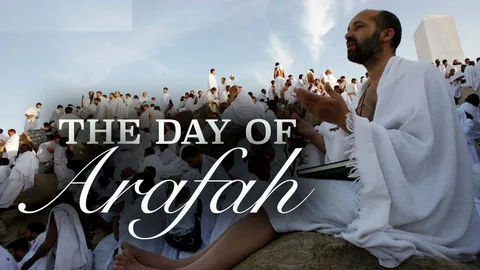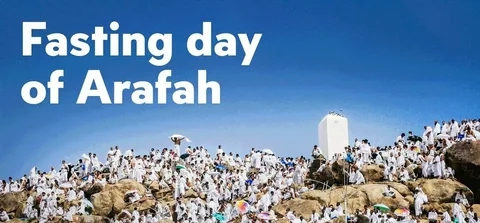Arafat Day is a pivotal date in the Islamic calendar, marking a day of immense spiritual significance. This day, falling on the 9th of Dhul Hijjah, the final month of the Islamic calendar, is renowned for its tradition of fasting, which is said to expiate the sins of the previous and coming year. Let’s delve into the importance and benefits of arafat day fasting.
Understanding Arafat Day

Arafat Day is named after the plains of Arafat, where Prophet Muhammad delivered his last sermon. This day precedes the major Islamic festival of Eid al-Adha and is integral to the Hajj pilgrimage.
Religious Significance
For Muslims not participating in the Hajj, fasting on this day is highly recommended. It commemorates the day when Allah perfected the religion, as mentioned in Islamic teachings.
Benefits arafat day fasting
Fasting on Arafat Day holds a unique and significant place in Islamic tradition, offering numerous spiritual and health benefits:
Spiritual Benefits
- Expiation of Sins: Fasting on Arafat Day is believed to expiate the sins of two years: the previous year and the coming year. This offers a profound opportunity for Muslims to seek forgiveness and start anew with a clean slate.
- Increased Piety and God-Consciousness: Engaging in fasting and dedicating the day to worship increases Taqwa (consciousness of God), which is a central aim in Islam. This heightened awareness helps in fostering a deeper connection with Allah and strengthens personal spirituality.
- Renewal of Faith: The act of fasting combined with prayer and recitation of the Quran on Arafat Day serves as a spiritual renewal, reminding Muslims of their commitments to their faith and the importance of their religious duties.
- Solidarity with the Hajj Pilgrims: For those not performing types of hajj in islam, fasting on Arafat Day offers a way to spiritually participate in the pilgrimage from afar. It creates a sense of unity and connection with the pilgrims standing on the plains of Arafat, experiencing the climax of their pilgrimage journey.
Health Benefits
- Detoxification: Fasting helps in detoxifying the body’s systems. By abstaining from food and drink from dawn to sunset, the body gets a chance to cleanse itself of accumulated toxins, contributing to better health.
- Improved Metabolic Function: Temporary fasting can improve metabolic function by regulating glucose levels, reducing inflammation, and promoting healthier lipid profiles. This can contribute to overall long-term health improvements, including reduced risk of chronic diseases.
- Mental Clarity and Focus: Many fasters report experiencing heightened mental clarity and improved focus during and after fasting. The practice can lead to a clearer mind and an increased ability to concentrate.
- Weight Management: Fasting can also aid in weight management. Although Arafat Day is just one day, it can contribute to a decrease in calorie intake and help maintain a balanced weight.
Psychological Benefits
- Increased Self-Discipline and Self-Control: Fasting requires a considerable amount of self-discipline and control over one’s desires and habits. This discipline can extend into other areas of life, helping individuals manage their behavior and impulses more effectively.
- Empathy for the Less Fortunate: Experiencing hunger and thirst during the fast can increase empathy and understanding for those who lack sufficient food and water daily. This can foster a greater sense of gratitude and encourage more charitable actions.
- Reflection and Mindfulness: The act of fasting on Arafat Day encourages deep reflection and mindfulness about one’s life, actions, and spirituality. It is a time to reflect on personal growth and the direction one wants to take moving forward.
How to Prepare for Fasting

Preparing for a day of fasting, such as on Arafat Day, involves both physical and spiritual preparation. Here are some tips to help ensure a smooth fasting experience:
Physical Preparation
- Hydrate Well: In the days leading up to the fast, increase your intake of water to ensure you are well-hydrated. This helps prevent dehydration during the fasting hours, especially if fasting during warmer or dryer months.
- Nutritious Pre-Fast Meal (Suhoor): The pre-dawn meal, Suhoor, should be nutritious and filling to sustain you throughout the day. Focus on foods rich in complex carbohydrates, proteins, and healthy fats. Foods like oats, eggs, whole grains, nuts, and fruits are excellent choices. These not only provide energy slowly throughout the day but also keep you feeling full longer.
- Avoid Caffeine and Salty Foods: Reduce the intake of caffeine and salty foods in the days before the fast. Caffeine can cause dehydration and stimulate faster water loss, while salty foods can increase thirst.
- Adjust Your Schedule: If possible, adjust your schedule to allow for lighter activities during the fasting hours, especially if you experience lower energy levels. Plan more demanding tasks when you have more energy, typically shortly after the pre-dawn meal or after breaking the fast.
Spiritual Preparation
- Set Your Intentions: Reflect on the reasons why you are fasting and set a clear intention (niyyah) for your fast. This is crucial in Islamic practices as it aligns your actions with your spiritual objectives, such as seeking closeness to God and seeking forgiveness.
- Increase Religious Knowledge: Spend time learning about the significance of Arafat Day and the merits of fasting. Understanding the spiritual context can enhance your commitment and the quality of your fasting experience.
- Engage in Extra Prayers and Supplications: Plan to increase your engagement in prayers and supplications dua on day of arafat during the fasting day. This includes not only the mandatory prayers but also voluntary prayers (nafl) and reading the Quran.
- Mental Preparation: Prepare mentally by committing to patience and humility throughout the day. Fasting is not just abstaining from food and drink but also from negative behaviors such as lying, cursing, and arguing.
Prayers and Recitations: What to Read?
During Arafat Day, engaging in specific prayers and recitations can greatly enhance the spiritual significance and benefits of fasting. Here’s a guide on what to focus on in terms of prayers and Quranic recitations:
Prayers (Salah)
- Fajr (Dawn Prayer): Begin the day with the Fajr prayer, which is the first of the five daily prayers. This sets a spiritual tone for the day and aligns your intentions with your actions.
Special Prayers
- Dua of Arafat: The most important supplication to make on Arafat Day is the Dua of Arafat, a heartfelt plea made by pilgrims during their stand on the Mount of Arafat. Non-pilgrims are encouraged to recite it too, asking for forgiveness, mercy, and blessings. It goes:”There is no deity but God alone; He has no partners. To Him belongs dominion, and to Him belongs all praise, and He is over all things omnipotent.”
- Takbirat: It is customary to recite the Takbir (glorification of God) throughout the day, which enhances the celebratory and reverent atmosphere of the day before Eid.
The Day After Arafat Day
Eid al-Adha: The Festival of Sacrifice
The next day, Muslims celebrate Eid al-Adha, which commemorates the willingness of Prophet Ibrahim to sacrifice his son in obedience to God.
Connection Between Arafat Day and Eid al-Adha
The fast of Arafat Day prepares the faithful spiritually for the celebration and sacrifices of Eid al-Adha.
FAQs
What is the significance of fasting on Arafat Day?
Fasting on Arafat Day, observed on the 9th of Dhul Hijjah in the Islamic calendar, is highly significant for Muslims. It commemorates the day when Prophet Muhammad delivered his farewell sermon on the plains of Arafat during his final pilgrimage. Fasting on this day is believed to expiate the sins of the past and coming year, serving as a powerful spiritual cleanse.
How does fasting on Arafat Day differ from regular fasting?
Unlike regular fasting days outside of Ramadan, fasting on Arafat Day is specifically recommended for those not performing the Hajj pilgrimage. It is a non-obligatory fast but holds a unique merit, specifically linked to the forgiveness of sins. The focus is also more intensely on spirituality and reflection, particularly in the context of the Hajj season.
What are the best practices for breaking a fast on Arafat Day?
The best practice for breaking a fast on Arafat Day is to first pray Maghrib (sunset prayer) then break the fast with fresh dates and water, as was the custom of Prophet Muhammad. After these initial items, a light meal can follow. It's important to make du'a (supplication) while breaking the fast, expressing gratitude and seeking forgiveness.
How can one engage in charity on Arafat Day?
Charity (Sadaqah) on Arafat Day is highly encouraged. One can engage in giving alms to the poor, donating to charitable organizations, or helping out in community service. It is a day to spread kindness and generosity, reflecting the spirit of giving and communal support that characterizes this sacred occasion.
What should one do if they are unable to fast?
If someone is unable to fast on Arafat Day due to health reasons or other valid excuses, they can still partake in the spiritual benefits of the day through extra prayers, recitation of the Quran, and acts of charity. It is also recommended to make up the fast later if the impediment is temporary, like illness or travel.
Conclusion
Fasting on Arafat Day is not only a profound religious observance but also an opportunity for personal growth and community connection. As we reflect on this sacred practice, let us strive to carry its lessons forward, enriching our lives and those around us.


